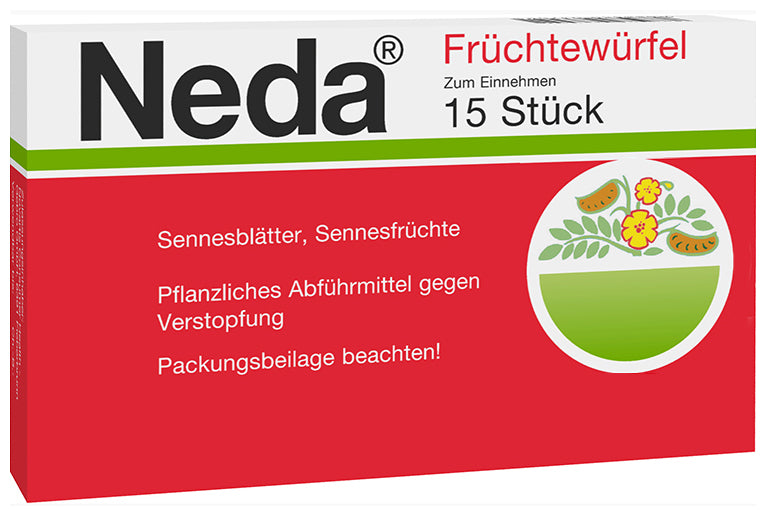Novartis
Neda 15 fruit cubes
Neda 15 fruit cubes
Couldn't load pickup availability
Neda fruit cubes are a herbal medicine for short-term use in occasional constipation (constipation). The active ingredients, senna leaves and senna fruits, stimulate the activity of the large intestine, with the effect occurring after 8-12 hours. The digestion and the absorption of the food components in the body remain unaffected. In addition to stimulating intestinal activity, Neda fruit cubes also increase the water content in the intestinal contents.
Neda fruit cubes are used in adults and young people aged 12 and over.
If you do not feel better or if you feel worse after 1 week, contact your doctor.
Contraindications
Neda fruit cubes must not be taken
- if you are allergic to senna leaves, senna pods or any of the other ingredients of this medicine (listed in section 6),
- in case of intestinal obstruction, intestinal constriction and/or intestinal laxity,
- in appendicitis,
- in acute inflammatory bowel diseases such as Crohn's disease, ulcerative colitis,
- abdominal pain of unknown cause
- severe dehydration with loss of water and electrolytes.
It is important to ensure that you drink enough fluids while you are taking it. The occurrence of diarrhea is a sign of overdose. If constipation lasts longer than 1 week, consult a doctor.
Like all laxatives, Neda fruit cubes should not be taken if there are unclear acute or long-term gastrointestinal problems. If laxatives are needed every day, the cause of the constipation should be determined. Taking laxatives that stimulate (stimulating) bowel activity beyond short-term use can lead to dependence with the need for increased dosages, bowel relaxation with reduced function and increased bowel sluggishness. The preparation should only be used if the constipation cannot be eliminated by changing your diet or by using bulking agents (e.g. linseed, psyllium).
In the case of incontinent adults, when taking Neda fruit cubes, prolonged skin contact with the faeces should be avoided by frequently changing the pad.
Patients with kidney disease should pay particular attention to possible disturbances in the electrolyte balance.
If the use of Neda fruit cubes regularly triggers spasmodic intestinal complaints, this is probably due to spastic constipation (spasm of the intestinal muscles). In such cases, the doctor should be consulted.
Neda fruit cubes are not suitable for reducing body weight.
Neda fruit cubes must not be used without medical advice and supervision:
- after abdominal surgery
- for longer use (more than 1 week)
interactions
Tell your doctor or pharmacist if you are taking/using, have recently taken/used or might take/use any other medicines.
With prolonged use or misuse, a potassium deficiency can increase the effect of certain drugs that strengthen the heart muscle (cardiac glycosides) and influence the effect of drugs against cardiac arrhythmia (antiarrhythmics). Interactions with medicines that cause a reversal of the normal heart rhythm (eg quinidine) and with medicines that can lead to a special form of heart rhythm disorders (QT prolongation) are possible. Potassium losses can be increased by the simultaneous use of certain drugs that increase urine output (diuretics), cortisone and cortisone-like substances (adrenal cortex steroids) or licorice root. Please note that this information may also apply to recently used medicines.
pregnancy and breast feeding period
If you are pregnant or breast-feeding, think you may be pregnant or are planning to have a baby, ask your doctor or pharmacist for advice before taking this medicine. In the absence of sufficient data, the use of this drug is not recommended during pregnancy and breast-feeding.
Neda fruit cubes contain sugar (contained in sugar beet syrup, glucose syrup and figs).
For diabetics: 1 Neda fruit cube contains approx. 5 g digestible carbohydrates (= 0.4 BE).
application
Always take this medicine exactly as described in this leaflet or as your doctor or pharmacist has told you. Check with your doctor or pharmacist if you are not sure.
The recommended dose is:
Adult:
- 1/2 - 1 cube in the evening before bed.
Young people from 12 years:
- 1/4 - 1/2 cube in the evening before bed.
It is usually taken at bedtime. The effect occurs in the morning without disturbing the night's sleep. The smallest dose that results in a stool with a soft, liquid consistency should always be used. Unless otherwise prescribed, follow the dosage exactly!
The dosage is set individually. To start, adults should not take more than 1/2 cube and adolescents over 12 years of age should not take more than 1/4 cube.
Patients with impaired kidney function: Caution should be exercised when using this medicine in patients with impaired kidney function or on a low-potassium diet.
Method of administration: For oral use.
The cube or half or quarter of it is chewed and swallowed with plenty of liquid, preferably 1 glass of water. If the cube needs to be divided, it should be done with a knife. It is recommended to cut the cubes diagonally. The medicine should not be taken lying down.
Duration of use:
If you do not feel better or if you feel worse after 1 week, contact your doctor. An application should not last longer than 1 week without a doctor's prescription. Laxatives should not be taken habitually and without medical supervision. A 2 to 3 application per week is often sufficient.
Use in children under 12 years of age is not recommended due to a lack of data.
side effects
Like all medicines, this medicine can cause side effects, although not everybody gets them.
The frequency of occurrence is not known.
Intolerance reactions in the form of itching, nettle rash (urticaria), skin rash, either localized or covering the whole body (so-called local or generalized exanthema) can occur. It can also lead to spasmodic gastrointestinal complaints. In these cases, a dose reduction is required. Long-term use or higher dosages (abuse) can lead to disturbances in the water and salt balance. Diarrhea that occurs can lead in particular to potassium losses. Long-term use can lead to the excretion of protein and blood in the urine. Furthermore, if the product is used improperly over a long period of time, discoloration of the intestinal mucosa (pseudomelanosis coli) can occur, which usually disappears after the preparation has been discontinued. A harmless red discoloration of the urine may occur during the course of treatment. A faint red discoloration of the urine that occurs with an alkaline reaction is harmless.
composition
The active ingredients are: 1 cube contains 0.5 g senna leaves (Sennae folium) and 0.5 g senna fruits (Sennae fructus), adjusted to 30 mg hydroxyanthracene derivatives, calculated as sennoside B.
The other ingredients are: Fruct. Caricae (Figs), Sugar Beet Syrup, Liquid Paraffin, Glucose Syrup, Lactic Acid, Tartaric Acid, Potassium Sorbate, Orange Flavor, Purified Water.
Share


